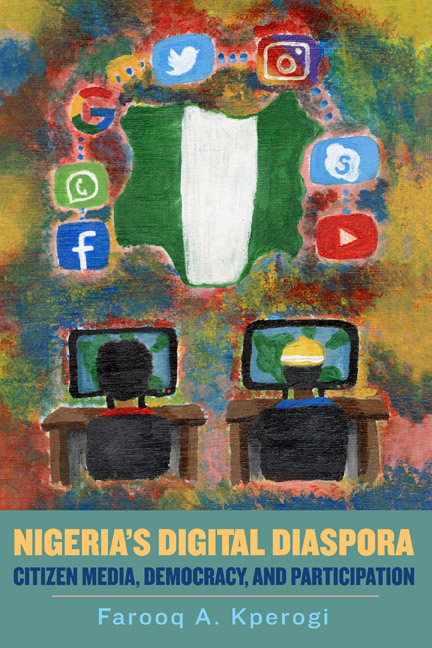Book contents
- Frontmatter
- Dedication
- Contents
- Acknowledgments
- Introduction
- 1 Citizen and Alternative Journalism: Mapping the Conceptual Contours
- 2 The Nigerian Press: From Colonial Evangelism to Guerrilla Journalism
- 3 The Nigerian Digital Diasporic Public Sphere
- 4 Profiles of Diasporic Citizen Media Sites
- 5 From the Diaspora to the Homeland: Role Reversal in News Flows
- 6 The Nigerian Government’s Response to the Diasporic Citizen Media
- 7 Domestic Online Media, Social Networked Journalism, and Participation
- 8 Mainstreaming of Diasporic Citizen Journalism and Implications for Nigerian Journalism
- Notes
- Bibliography
- Index
8 - Mainstreaming of Diasporic Citizen Journalism and Implications for Nigerian Journalism
Published online by Cambridge University Press: 13 April 2021
- Frontmatter
- Dedication
- Contents
- Acknowledgments
- Introduction
- 1 Citizen and Alternative Journalism: Mapping the Conceptual Contours
- 2 The Nigerian Press: From Colonial Evangelism to Guerrilla Journalism
- 3 The Nigerian Digital Diasporic Public Sphere
- 4 Profiles of Diasporic Citizen Media Sites
- 5 From the Diaspora to the Homeland: Role Reversal in News Flows
- 6 The Nigerian Government’s Response to the Diasporic Citizen Media
- 7 Domestic Online Media, Social Networked Journalism, and Participation
- 8 Mainstreaming of Diasporic Citizen Journalism and Implications for Nigerian Journalism
- Notes
- Bibliography
- Index
Summary
This chapter distills and coalesces the data presented in the preceding chapters of this book. It draws conclusions about the future of online journalism and discursive democracy and makes recommendations for future research based on the ruminative and perspectival synthesis of the data in previous chapters.
The emergence, popularity, and progressively soaring impact of the Nigerian diasporic citizen media examined in the previous chapters were actuated and propelled by six underlying factors. The first was the death or dearth of a critical press tradition in Nigeria—especially the adversarial guerrilla press tradition that reigned in the 1990s—in the face of the profound moral putrescence that the restoration of democratic rule has paradoxically inculcated since 1999. At a time when billions of dollars were brazenly stolen and salted away in foreign bank accounts by political officeholders and when bald-faced cronyism and avarice had overtaken the public sphere, the national media, for the most part, either looked the other way or were actively complicit. This state of affairs was inconsistent with the progressive, agitational, and inquiring disposition that had defined the character, disposition, and performance of much of the Nigerian press since its founding in the mid-1800s. As was shown in chapter 2, the Nigerian press has historically been vigorously critical of the powers that be. It almost single-handedly dislodged colonialism and helped fight against military dictatorship. The guerrilla press of the 1990s especially had a powerful impact on the media practice and politics of Nigeria. One of its enduring legacies is that it has predisposed Nigerians to expect their press to be robustly fearless, critical, and uncompromisingly adversarial. Nevertheless, after winning the fight against military dictatorship, much of the national press lost its critical bite; the press appeared to have been anesthetized into a false sense of triumphalism at a time when corruption by the emergent political elite it helped to bring to the forefront took newer, more insidious forms. In many cases, the traditional Nigerian press was co-opted into the mindless looting of the national treasury that has attended the restoration of democracy, as the case studies in chapters 4 and 5 illustrate.
- Type
- Chapter
- Information
- Nigeria's Digital DiasporaCitizen Media, Democracy, and Participation, pp. 177 - 210Publisher: Boydell & BrewerPrint publication year: 2020

